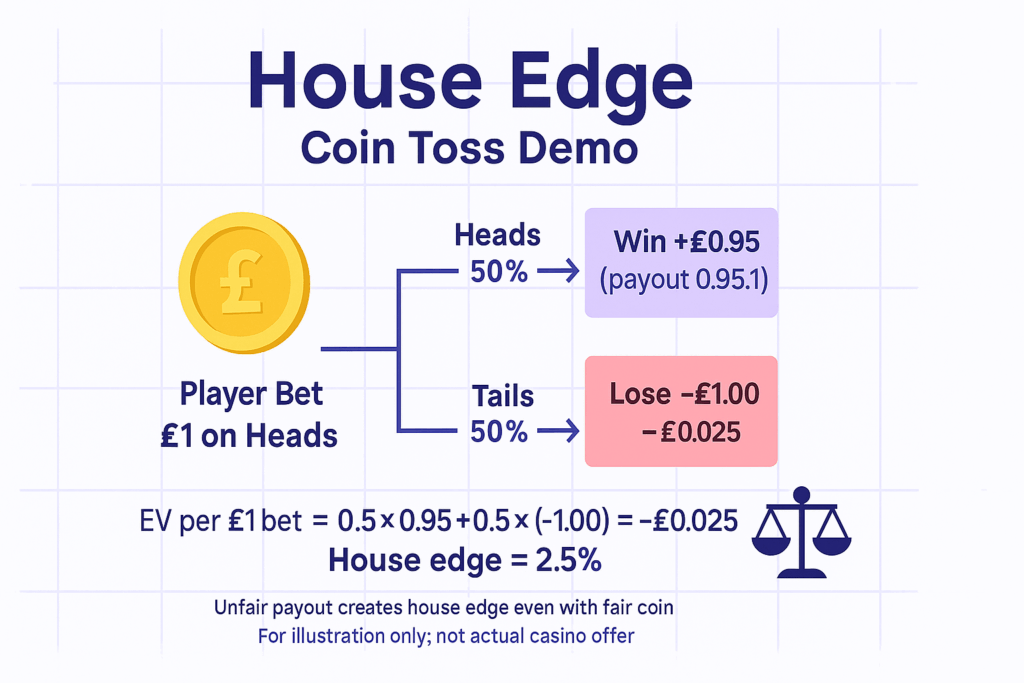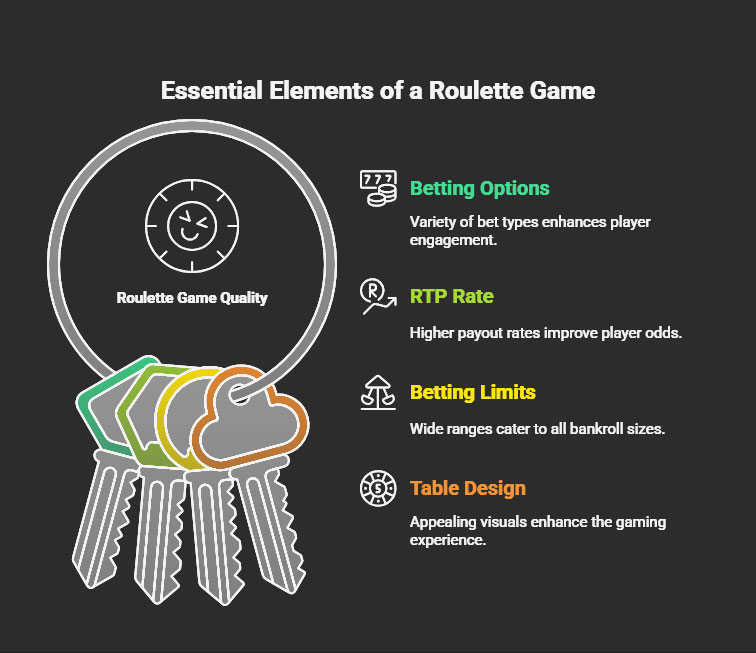
House Edge Explained
Published by Brett Chatz on October 12, 2020

Published by Brett Chatz on October 12, 2020
In the simplest term, the house edge refers to the amount in percentage that the house makes off every bet, considering it as a built-in profit margin. Yes, this may sound like they're up to no good but in actual fact, it all boils down to mathematics and odds.
🎯 House Edge Explained: Beat the Odds with Smarter Casino Play
Key Takeaways:
- 🎰 The house edge is the built-in profit margin for casinos on every game.
- 📊 Lower house edge games like blackjack offer better odds for players.
- 🧠 Understanding it helps stretch your bankroll and avoid costly mistakes.
- 🛠️ Strategic play and bonuses can sometimes reduce its impact.
🧩 Overview: What Is the House Edge?
The house edge is the percentage that represents the casino’s average profit from each bet placed. It’s not a scam or a trick — it’s simply the way games are mathematically structured to give the house a small advantage over time. Think of it as an invisible fee paid over the long run for the excitement and chance to win.
For instance, if a game has a house edge of 5%, the casino expects to keep $5 for every $100 wagered over time. While players can and do win in the short term, the longer you play, the more this statistical edge plays out in the house’s favor.
🔍 How It Works: The Math Explained
Casinos offer payouts slightly below the true odds of winning. This mathematical difference — however small — adds up over time. Let’s look at an example:
Suppose you bet $1 on a 50/50 coin flip. Fair odds would pay $2 for a winning bet. Instead, if the casino pays just $1.90 when you win, that 10¢ difference represents a 5% house edge. This means the casino earns 5 cents on every dollar wagered over many rounds of play.

This subtle advantage allows casinos to remain profitable over time, even while individual players win or lose randomly in the short term.
🎲 House Edge by Popular Casino Games
Different games have different built-in advantages for the house. Here’s a breakdown of average house edges across common casino games:
| Game | House Edge | Quick Insight |
|---|---|---|
| Blackjack (Optimal Strategy) | ~0.5% | Rewards skilled play and strategy. |
| European Roulette | 2.7% | Single zero gives better odds than American Roulette. |
| American Roulette | 5.26% | Double zeros increase the house edge significantly. |
| Slots | 2% – 15% | Massive variance depending on machine and casino setup. |
| Craps (Pass Line Bet) | 1.41% | Favorable odds when sticking to basic bets. |
📌 Best Practices to Minimize the Edge
- Choose Wisely: Stick to games with statistically lower house edges — notably blackjack (with proper strategy), baccarat, and craps.
- Study Strategy: Learn and practice basic strategies — especially for games like blackjack and craps where skill impacts outcomes. Visit our Blackjack Strategy Guide for expert help.
- Use Bonuses Smartly: Casino bonuses can reduce the effective house edge when used within reasonable wagering conditions. Explore our bonus comparison page to find value deals.
- Stick to Budget: Set a bankroll before playing and avoid increasing bets to chase losses.
- Try Before You Buy: Play free versions of games on our free games portal to practice risk-free.
❌ Common Misconceptions
- “I’m due for a win.” 👉 Each bet is independent. The house edge doesn’t ‘reset’ or diminish based on past losses.
- “Slot machines are rigged.” 👉 Regulated online and land-based casinos use RNGs (random number generators) that ensure fair outcomes.
- “You can beat roulette with a system.” 👉 Systems like Martingale don’t change the odds and often accelerate losses.
❓ Frequently Asked Questions (FAQ)
- Q: Is the house edge the same at all casinos?
A: No, it varies by game rules, software, country, and even bet type. Always check the specifics for each game. - Q: Can I ever win against the house?
A: Yes! In the short term, luck plays a major role — but over time, the house edge ensures consistent profitability for the casino. - Q: Which game has the lowest house edge?
A: Blackjack (with optimal strategy) typically offers the lowest edge around 0.5%. - Q: Are online games more ‘rigged’ than land-based?
A: Not if you’re playing at licensed, regulated online casinos. Look for games audited by reputable testing bodies. - Q: Can bonuses help reduce the house edge?
A: Yes, when applied correctly. Bonuses allow longer play or higher wager volume, giving edge-savvy players more control. - Q: What’s the difference between RTP and house edge?
A: RTP (Return to Player) is the opposite of the house edge. If RTP is 96%, the house edge is 4%. - Q: Is skill involved in beating the house edge?
A: Yes — in games like blackjack and video poker, skill can narrow the gap significantly. - Q: Do slot machines have the highest house edge?
A: Often yes, but some modern machines offer low house edges depending on settings and payback percentage. - Q: What’s a good house edge for casual players?
A: Anything under 2% is relatively player-friendly and helps extend playtime. - Q: Where can I learn more about strategy?
A: Check out our in-depth guides on Blackjack Strategy and Roulette Tips for beginner and intermediate players alike.
🏁 Final Thoughts: Play Wisely, Win Smarter
The house edge may be a permanent part of casino gaming, but understanding it doesn’t diminish your fun — it amplifies it. When you recognize how games are structured, you play with clearer expectations and sharper strategies.
Whether you’re placing chips on red or pulling the slot lever, being informed is your biggest advantage. Ready to level up your game?
“The house doesn’t always win… but it usually does.” 😉
🎯 Play responsibly. Learn more about setting limits and safe play in our Responsible Gambling Guide.








